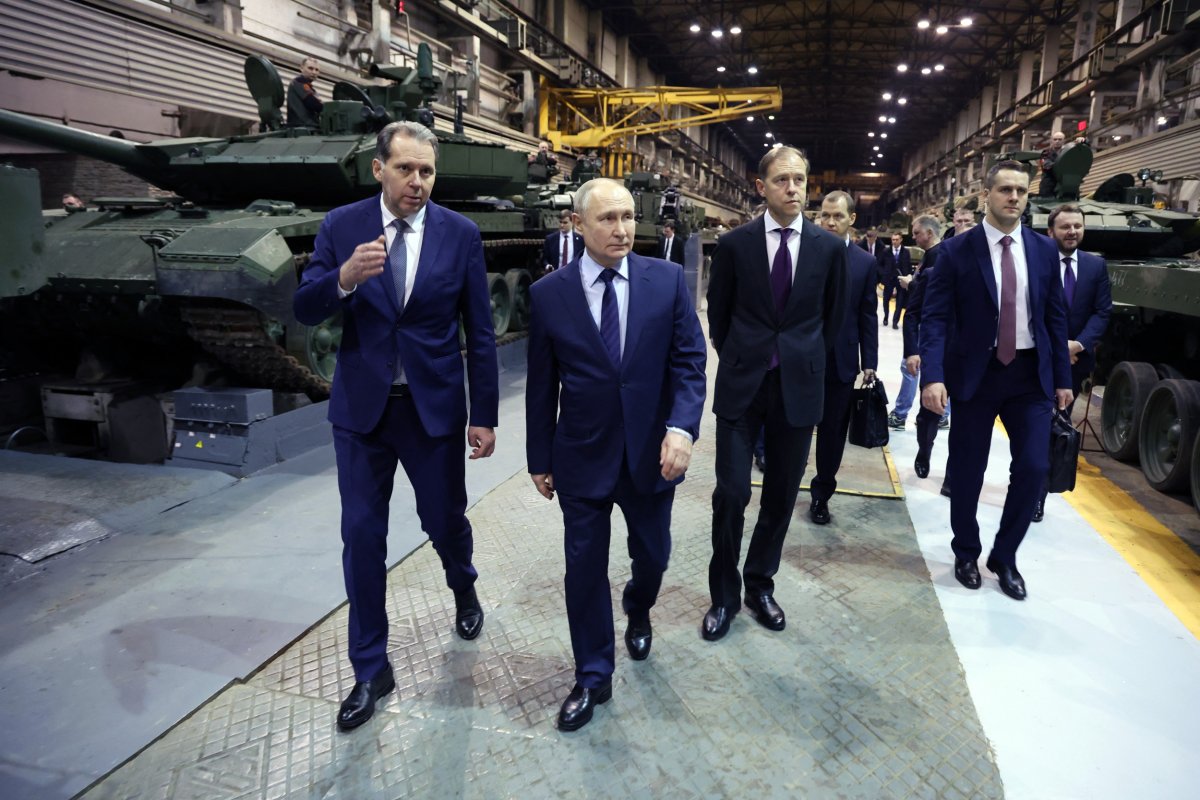Russia’s once-potent arms export industry is collapsing amid the pressures of its war on Ukraine and a struggling economy, according to new data released by the Stockholm International Peace Research Institute (SIPRI) on Sunday.
The organization’s annual update of the arms industry saw Russia fall to third place—behind France and the U.S.—among the globe’s largest weapons exporters, the first time it has surrendered the second spot.
Overall, Russia’s arms exports fell by 53 percent from 2014–18 to 2019–23. “The decline has been rapid over the course of the past five years,” SIPRI’s release noted, adding that Russia’s number of significant customers has fallen from 31 to 12 nations over this period.
Newsweek has contacted Russia’s Industry and Trade Ministry to request comment.
-/AFP via Getty Images
Pieter D. Wezeman, a senior researcher in the SIPRI Arms Transfers Programme, told Newsweek the outlook is bleak for Moscow.
This “is not just a short dip, but it is likely to be something from which Russian arms exports are not going to recover to levels that we saw before,” Wezeman explained.
“We’ll see very significant challenges to its efforts to continue to be a major supplier of arms in the world. And with the figures that we have about the weapons that are on order, Russia is also lagging behind.”
“It can change fast, of course; new major orders may come in. But we haven’t seen them yet. And some of the orders that are there, we just have to wait and see if they actually will lead to deliveries,” Wezeman continued.
Now beyond its two-year mark, Russia’s war on Ukraine, having likely claimed more than half a million casualties, has hoovered up Moscow’s military industrial resources. President Vladimir Putin has shifted the Russian economy onto war footing in a bid to meet the challenge, raiding long-neglected military stores and seeking new foreign suppliers.
Russia’s industry at home and trade abroad have been constrained by Western sanctions. Though Moscow has embarked on a broad campaign of sanctions busting, restricted access to Western technology has undermined its more advanced weapon production. The Kremlin has even abandoned the much-hyped T-14 Armata main battle tank because it is considered too expensive.
Exclusion from international financial markets has also hampered its ability to make deals.
“The question is to what extent the Russian arms industry is able to cater for the Russian demand and for export at the same time, taking into account also that there are sanctions related to technology that Russia still needs to produce arms, and also for payment options, something which apparently still has been hampering ongoing deals with India,” Wezeman said.
The poor performance of Russian tech on the battlefields of Ukraine has done little to help military industrial salespeople. Russian ships have been repeatedly sunk, planes downed and air defense systems found wanting. Moscow’s big-ticket items have not delivered.
Export shrinkage has left the Russian arms industry reliant on Asia and Oceania, the states of which account for 68 percent of total exports from 2019–23. India made up 34 percent and China 21 percent. But countries emerging as potential superpowers have less and less need for what Russia has to offer.
“Those are the two major changes that we see in Russia arms exports, and that has an enormous impact on the total level of Russian arms exports,” Wezeman said of lessening Indian and Chinese business.
“It has not been able to convince India to acquire more Russian combat aircraft, a relatively small batch to replace some that have crashed before,” he said. “India has turned to France.”
“It’s looking at the U.S. for advanced anti-submarine warfare capabilities to name something there. And of course, it’s also developing its own arms industry and is now able to produce, for example, ships, combat aircraft, which before it probably would have bought from Russia.”

ALEXANDER KAZAKOV/POOL/AFP via Getty Images
Political concerns also loom large for Moscow’s best customers. New Delhi, for example, wants to show it can cooperate with the U.S. against the threat from China. The same is true of Vietnam and for Egypt which has cut its spending on Russian arms to almost nothing, preferring U.S. goods, military aid, and political support.
The gradual reversal of the Moscow-Beijing power dynamic also extends into weaponry. China, Wezeman said, “has developed an arms industry which is now sufficiently competitive for China itself to acquire its own arms, and not to really look at arms imports from Russia anymore, with a few exceptions.”
“China just doesn’t want to be dependent on Russian equipment, especially if they can make stuff which is basically as good or by now, potentially even better—or soon to be better. So, that market is really disappearing quickly.”
It is unclear where Moscow might make up the growing gap in its exports. “In Europe, Russia wasn’t that important before, certainly it’s not anymore,” Wezeman said. “In the Middle East, it never had a real breakthrough. In Latin America, the only market it really had was the one in Venezuela for a few years until that country went down economic drain.”
“The only place where you potentially could see real interest would then be in the Middle East,” he added. “But even there also, I think it’s too early to make any forecasts in this regard.”
Russia, Wezeman said, should be “careful in making any assumptions about the likelihood that you can return to that market with the kind of equipment that Russia has on offer right now.”
Uncommon Knowledge
Newsweek is committed to challenging conventional wisdom and finding connections in the search for common ground.
Newsweek is committed to challenging conventional wisdom and finding connections in the search for common ground.


